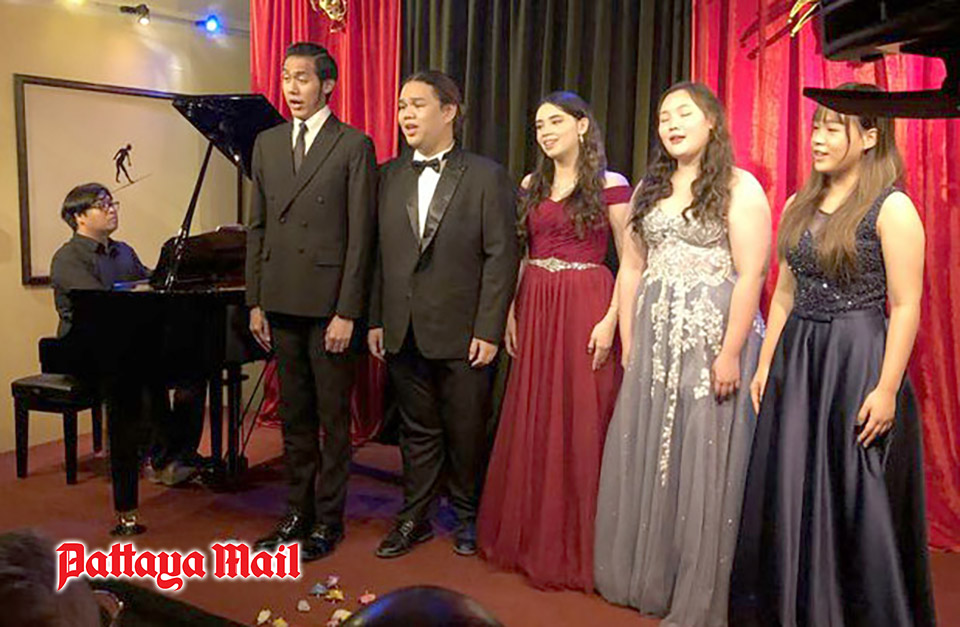
Opera concerts are always popular events at Ben’s Theater and the recent one, entitled Under the Shining Night was no exception. The five singers were mostly advanced students of Professor Nancy Tsui–Ping Wei, voice teacher at the College of Music, Mahidol University and they performed to a full house. As always, the programme was varied, well–balanced and carefully planned, with careful thought given to continuity. Some of the numbers were linked together musically or dramatically and this created a satisfying experience for the audience. Dramatic elements were introduced and a few props employed to bring a touch of reality to the performances. One of them was a wicker basket which appeared so often that it should have been given a credit in the programme.
The concert began with one of the opera’s most popular melodies; the Barcarolle from Offenbach’s “The Tales of Hoffmann”. A barcarolle is a serenade traditionally sung by Venetian gondoliers and Pichamon Mookmaneekun and Pimada Ko–Amornsup gave a lovely lilting performance with good vocal blending. Before the duet began, pianist Anant Changwaiwit came on stage to begin the accompaniment alone, then a few moments later the two singers walked on and joined in at the appropriate moment. It was a clever touch and a novel way to begin the concert. In contrast, Alisa Arial and Pichamon gave a pleasing performance of Purcell’s duet, Two daughters of this aged stream are we from his 1691 opera, “King Arthur”. I was impressed with their phrasing and their intonation which, apart from a couple of shaky moments was spot-on.
Pimmada and Jatuphol Nuanjan gave a well-staged performance of Mozart’s Bei Männern welche Liebe fühlen from his popular-style opera of 1791, “The Magic Flute”. Pimmada’s delicate voice blended well with that of Jatuphol and their performance was enhanced by beautifully sympathetic piano accompaniment from Anant. Throughout the concert, his playing always exemplary, perfectly balanced with the singers and always musical: that difficult-to-define quality that sets an excellent performance apart from an ordinary one. Not surprisingly, Anant is in great demand in his native Thailand and abroad not only for concerto appearances but also for his superb ability to accompany. He has played the Chopin Piano Concerto No. 1 and the Prokofiev Piano Concerto No.3 with the Thailand Philharmonic Orchestra and the Tchaikovsky Piano Concerto No.1 with the North Czech Philharmonic Orchestra.

In the amusing Mozart aria Pa–Pa–Pa Papageno, the character Papageno can hardly believe his eyes when he is reunited with his perfect match, Papagena. It was given a delightful and compelling performance by Alisa and Jatupol Pinthip with excellent ensemble, lovely staging and a crisp piano accompaniment from Anant. It was one of the highlights of the programme. Anant also excelled in Humperdinck’s Sandmännchen and Abendsegen from the fairy-tale opera “Hänsel und Gretel” which the composer completed in 1892. It was a remarkably beautiful and well–presented performance with superb singing from Alisara, Pimmada and Pichamon. The hymn–like evening prayer was commendably sung with perfect vocal blending.
Another highlight, for me at least, was Rossini’s La Regata Veneziana, which is from Les Soirées Musicales, a collection of twelve songs and duets composed in the early 1830’s. Alisara and Pichamon gave a delightfully animated and well-staged performance, in which the two singers are excitedly watching a boat race on the canal. I liked the way their physical movements reflected the lively piano accompaniment. There was perfect vocal blending from Jatuphol Nuanjan and Jatupol Pinthip in Mendelssohn’s Auf Flügeln des Gesanges (“On wings of song”), a well–known duet from a collection published in 1834. Jatupol Pinthip invariably has excellent audience contact and a confident presence on stage.

Alisara and Pimmada provided a splendid performance of Sous le dôme épais, better known as the “Flower Duet” from the 1883 opera “Lakmé” by Léo Delibes. In Britain, this piece achieved fame in the 1980s thanks to a long series of British Airways television commercials. The duet is sung by Lakmé and her servant Mallika as they go to gather flowers. Both singers had excellent stage presence, almost perfect intonation and lovely vocal balance. I especially liked the way that the duet was musically blended into the next piece, the Mozart trio Soave sia il vento (“May the wind be gentle”) from the opera “Così fan tutte”. In the song, the three singers wish the departing soldiers safe travels as their ship sails away. Sung by Pichamon, Alisara and Jatuphol Nuanjan they really seemed on top form and gave a beautifully balanced performance. The final piece in the first part of the programme was the wistful song Sure on this Shining Night from a set of songs entitled Nocturnes, published in 2005 by the American composer Morten Lauridsen. It’s a tranquil, timeless setting of a reflective short poem by James Agee. The performance by the full ensemble was incredibly moving, emotionally charged and perfectly controlled with superb ensemble singing. Musically, it was one of the highlights of the entire evening.
Most of these fine young singers are not newcomers to Ben’s Theater and it has been fascinating to see how their voices, technical skills, stage presence and musicianship have developed. Pimmada (soprano) has just turned eighteen and recently graduated from Satit Prasarnmit Demonshation School Bangkok. She started learning music at the age of seven, and started classical voice study in 2021. She recently won 1st prize at the Princess Galvani Vadhana Institute of Music Voice Competition and this was her first appearance at Ben’s Theater. Alisara (soprano) was born in 2003 in Washington, USA and started viola lessons at the age of nine. At fifteen, she began taking voice lessons and since then, she has participated in several concerts and contests. She was a successful finalist in a recent Osaka International Music Competition in Japan, where she received the Espoir Prize in 2023. Pichamon (soprano) was born in Bangkok in 2002 and began singing lessons at an early age and she has won many prizes in competitions both in Thailand and abroad.
Born in Bangkok in 2000, Jatuphol Nuanjan (bass–baritone) began studying trombone at the age of ten. From an early age, he has had a passion in singing and began vocal tuition at Mahidol. In 2021, he was one of the finalists at the Osaka International Music Competition in Japan. Jatupol Phintip (light baritone) was born in Rayong in April 2002. His first instrument was saxophone but he later developed a great interest in singing. In 2019, he was Thailand regional round winner at the Excellence International Music Competition in Taiwan and won First Prize in the Final Round.

After the interval, Pichamon and Alisara sang Dvorák’s aria Mesičku na nebi hublokém (“Song to the Moon”) from his 1901 fairy-tale opera “Rusalka”. Once again, the performers used the effective technique of starting the piano accompaniment before the singers appear which avoids the singers having to stand on the stage doing nothing. Alisara’s singing was particularly compelling in this aria. To my mind, the most successful performances in the second half were Lehár’s duet: It goes to show from “The Merry Widow”, superbly performed with excellent characterization by Alisara and Jatupol Pinthip and the familiar song Good Night from Paul Abraham’s operetta “Victoria and Her Hussar” was first performed in 1930. The performers showed excellent stage presence and provided a lovely gentle performance of this bitter-sweet melody. It was one of the most touching performances of the evening. The concert concluded with a confident performance by the full ensemble; the song Dream with me from Bernstein’s 1950 musical “Peter Pan”.
The full-ensemble encore number was a lively rendition of Libiamo ne’ lieti calici, the famous duet with chorus from Verdi’s 1853 opera, “La Traviata” and one of the best-known melodies in the repertoire. The singers excelled and really knew how to “work the audience” for this final rousing number. The ensemble singing was splendid and the performance made a joyful and boisterous end to a memorable evening.






